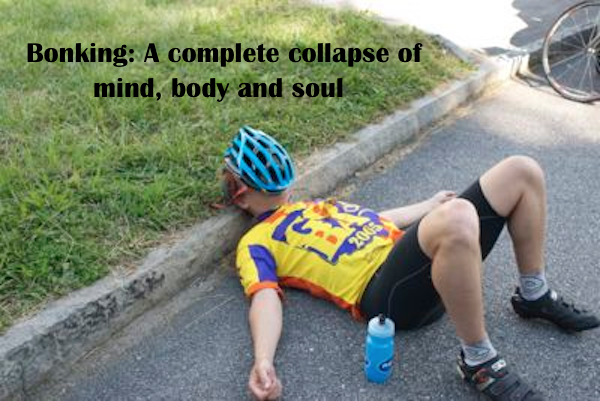Bonking
 Bonking is one of the worst feelings you can have on two wheels. If you have ever bonked on a ride you will know what I am talking about, a complete collapse of your mind, body and soul. One minute you are smiling, flying along and the next minute you can barely stop the drool from coming out of your mouth, never mind trying to turn over the pedal crank!
Bonking is one of the worst feelings you can have on two wheels. If you have ever bonked on a ride you will know what I am talking about, a complete collapse of your mind, body and soul. One minute you are smiling, flying along and the next minute you can barely stop the drool from coming out of your mouth, never mind trying to turn over the pedal crank!
What Does Bonking Mean
Bonking is when your glycogen stores have been depleted in your liver and muscles to dangerously low levels. You know when you have bonked because of the unmistakeable fatigue that comes over you.
Bonking while Cycling
Bonking on the bike, also known as “hitting the wall” in running, is simply when you are completely and utterly exhausted. You have no more energy left in the tank. The glucose levels in your blood is abnormally low so parts of you start to systematically shutdown.
Your legs and your brain both require glucose in order to operate, but your brain takes priority. In the beginning, your legs lose considerable power and it becomes increasingly difficult to continue pedaling, but as you continue to ride then your brain function also starts to deteriorate. So not only are you ridiculously weak, but you may turn to the dark side and become irritable, emotional and even hostile.
Types Of Bonks
Dead Legs – your legs just will not go even though the rest of your body is keen.
Complete Meltdown – a complete body shutdown. Nothing is working! A great combination of nutrition errors, dehydration, poor training and overexertion combined into one.
Signs That You Have Bonked
Physical Signs of bonking
- Immense fatigue
- Uncontrollable shaking or shivering
- Unable to balance – dizzy or lightheaded
- Increased sweating
Mental Signs of Bonking
- Loss of concentration
- Irritable, emotional or hostile
- Confused
- Mentally defeated – all thoughts turn negative ie. you have to stop, unable to finish event, feeling like the grim reaper has come to take you…
How do you avoid bonking?
Avoiding bonking in theory is simple – eat enough carbohydrates to convert into glucose to fill your glycogen stores. The problem is that you can only process 60g to 90g of carbohydrates an hour as discussed in what to eat on a long bike ride . So no matter how much you eat you can only convert so much of it to usable energy. Eating too much is a whole other can of worms… So if you are eating the correct amount then it will come down to monitoring intensity and making sure you are not exceeding your limit and staying properly hydrated.
The time to avoid bonking in a race really begins long before, in your training, and continues through the implementation of a pre-race plan of food and race nutrition, hydration and pacing.
Early Detection of Bonking
Bonking can hit you like a ton of bricks with no warning, but sometimes (especially if you have had extensive first hand experience with bonking) you can start to see the signs of the bonk coming on. Riding starts to get much more difficult, you start losing focus or getting hangry (hungry & angry).
What Do I Do If I Have Bonked or Feel it Coming On
Immediately decrease intensity, start to eat simple carbohydrates and try to rehydrate – drinking sports drink takes care of both of those at once.
If you are deep in to a bonk consider getting picked up or dropping out of the current event especially if it is not an important one. Recovery time is exponentially longer the harder you try to push through. If you are stubborn and want to finish – get off the bike, take in some carbohydrates and continue when you are no longer dizzy, disoriented and have sufficient energy.
If you catch yourself early enough then you may be able to continue riding slowly as you take in some simple carbs, often this can save a race.
Bonking is actually a way of protecting the body from further damage, if you will not look out for your body properly, it will! Do yourself a favour and don’t let it get to that point.
Have you ever bonked? Share your insight or stories below.